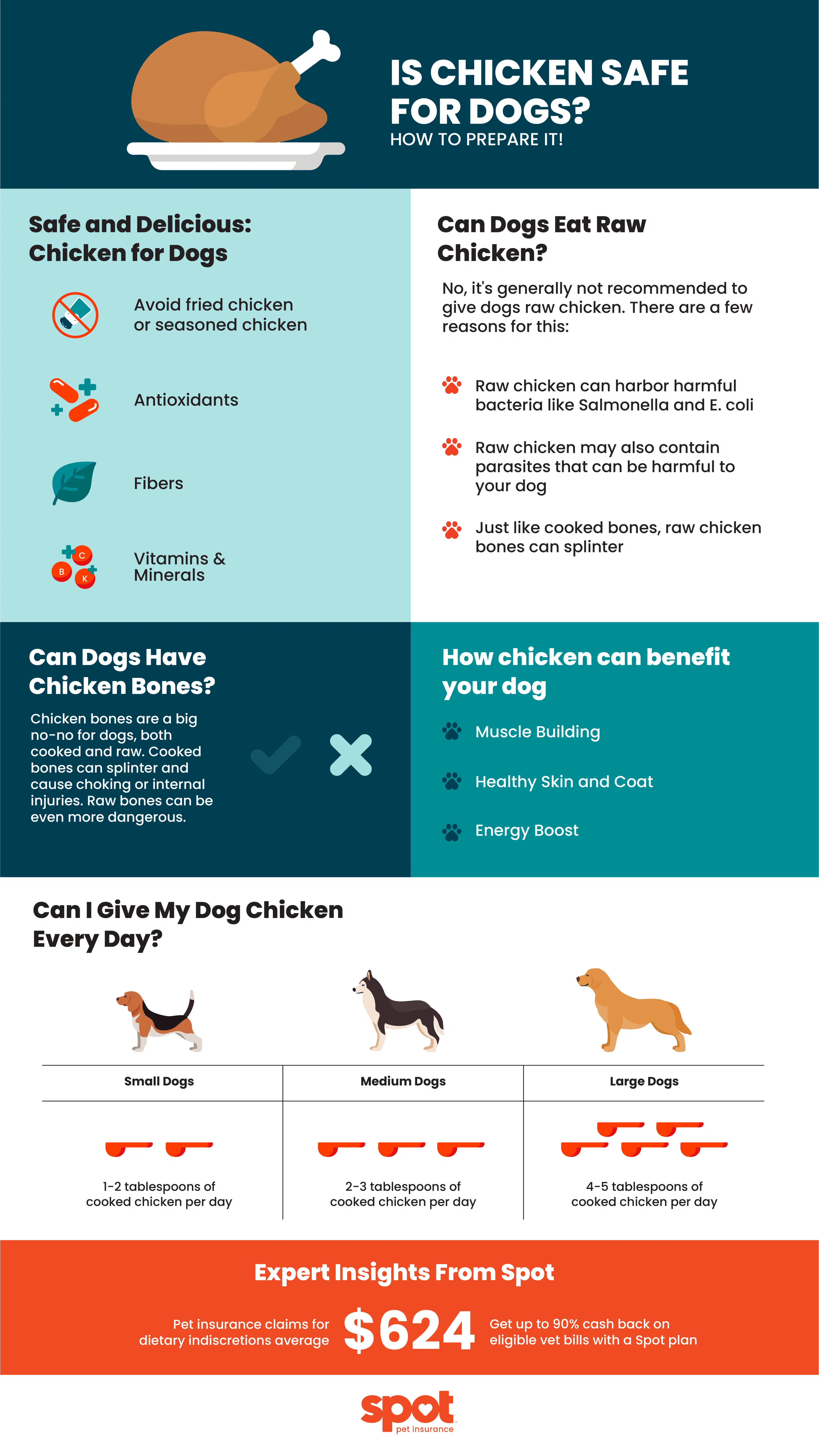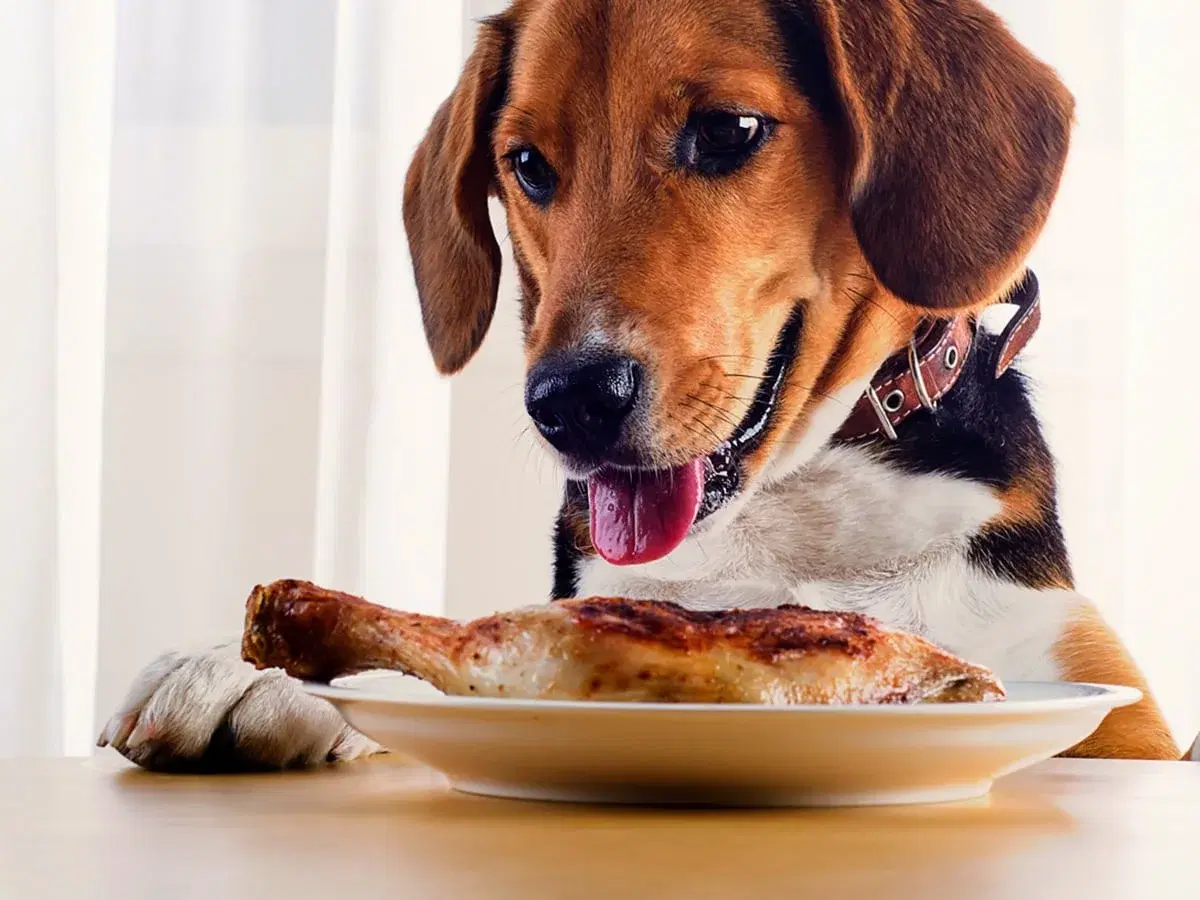Chicken is a popular protein source found in many commercial dog foods, and for good reason! It's a lean and easily digestible meat that provides essential nutrients for your canine companion. But can you also give your dog cooked chicken as a treat or add it to their regular meals? The answer is yes, but there are a few precautions you should take.
Safe and Delicious: Chicken for Dogs
Cooked, boneless, skinless chicken is a healthy and delicious treat for most dogs. Here's what to keep in mind:
Preparation is Key: Avoid fried chicken or chicken seasoned with spices and herbs. These can be unhealthy for dogs and irritate their digestive systems.
Cooking Methods: Boiling, baking, or pressure cooking are all safe ways to prepare chicken for your dog.
Portion Control: The amount of chicken you give your dog depends on their size and activity level. A small dog might only need a tablespoon of shredded chicken, while a larger dog could handle more.
Skip the Bones: Chicken bones can splinter and cause choking or internal injuries. Never give your dog cooked or raw chicken bones.
Can Dogs Eat Raw Chicken?
No, it's generally not recommended to give dogs raw chicken. There are a few reasons for this:
Bacteria: Raw chicken can harbor harmful bacteria like Salmonella and E. coli, which can cause foodborne illnesses in dogs.
Parasites: Raw chicken may also contain parasites that can be harmful to your dog's health.
Choking Hazard: Just like cooked bones, raw chicken bones can splinter and pose a choking hazard.
If you're interested in feeding your dog a raw diet, it's important to consult with a veterinarian and a qualified pet nutritionist to ensure they are getting a balanced diet and that the food is prepared safely.
Can Dogs Have Chicken Bones?
Chicken bones are a big no-no for dogs, both cooked and raw. Cooked bones can splinter and cause choking or internal injuries. Raw bones can be even more dangerous, as they are more brittle and prone to splintering.
If your dog swallows a chicken bone, contact your veterinarian immediately. Symptoms of a bone obstruction can include vomiting, lethargy, abdominal pain, and constipation.
Expert Insights From Spot
While it can be fun to share our favorite foods with our pets, pet parents should keep in mind that sometimes, eating human food can upset a pet's stomach. Internal data from Spot shows that on average, claims for dietary indiscretions (pets eating too much of what they shouldn't) cost $572. This high-cost highlights why pet parents should keep an eye on what their pets eat and do their research before sharing their favorite snacks with their dogs. Being mindful of what treats we share with our pets can help keep them healthy while helping pet parents avoid unnecessary vet bills. Learn more about pet insurance and how pet insurance works.
Is Chicken a Good Addition to a Dog's Diet?
Yes, chicken can be a good addition to a dog's diet in moderation. It's a lean protein source that provides essential amino acids, vitamins, and minerals. It's also highly digestible, making it a good option for dogs with sensitive stomachs.
Here's how chicken can benefit your dog:
Muscle Building: Protein helps build and maintain strong muscles, which is important for an active dog.
Healthy Skin and Coat: Chicken contains essential fatty acids that promote healthy skin and a shiny coat.
Energy Boost: Protein provides energy to fuel your dog's playful and active lifestyle.
However, chicken shouldn't be the only source of protein in your dog's diet. A balanced dog food should be the foundation of their nutrition. You can add cooked chicken as a topper or use it for training treats in moderation.
Can I Give My Dog Chicken Every Day?
Here's a good rule of thumb:
Small dogs: 1-2 tablespoons of cooked chicken per day
Medium dogs: 2-3 tablespoons of cooked chicken per day
Large dogs: 4-5 tablespoons of cooked chicken per day
Remember: Always consult your veterinarian before making any significant changes to your dog's diet, especially if they have any underlying health conditions.

Dog-Friendly Fruits and Vegetables
While chicken is a great protein option, you can also add some variety to your dog's diet with safe fruits and vegetables. Here are some healthy options:
Fruits: Apples (cored and sliced), bananas, blueberries, cantaloupe, cranberries (in small amounts), mangoes (ripe flesh only, no pit or skin), oranges (peeled segments), pears (cored and sliced), raspberries, strawberries (hulled)
Vegetables: Bell peppers (red, yellow, green), broccoli (florets in moderation), Brussel sprouts (cooked and chopped), carrots (cooked or raw), green beans, peas (fresh or frozen, thawed), sweet potatoes (cooked and mashed)
Always: Wash fruits and vegetables thoroughly before giving them to your dog. Cut them into small, bite-sized pieces to prevent choking.
Remember: Fruits should only be given as occasional treats because they are high in sugar.
Fruits and Vegetables Dogs Can't Eat
Some fruits and vegetables contain toxins or compounds that can be harmful to dogs. It's important to avoid these entirely and keep them out of reach of your furry friend. Here's a list to be aware of:
If you suspect your dog has eaten any of these foods, contact your veterinarian immediately. Symptoms of poisoning can vary depending on the ingested amount and the specific fruit or vegetable. Early intervention is crucial for a full recovery.
Expert Insight From Spot
While sharing our favorite foods with our pets can be tempting, it's important to remember that not all human foods are safe for dogs. Spot's internal data shows that pet insurance claims for dietary indiscretions average $642*, highlighting the importance of caution and research before sharing snacks with your pet.
Key Takeaways
Can dogs eat chicken nuggets? Chicken can be a delicious and nutritious addition to your dog's diet, but it's important to remember moderation and safe preparation methods. Stick to cooked, boneless, skinless chicken and avoid raw chicken or cooked bones altogether. If you're unsure about any food, it's always best to err on the side of caution and consult with your veterinarian. By following these guidelines, you can safely share some tasty chicken with your canine companion and keep them happy and healthy.

Mostly a tech person, always a pet person. I am dedicated to improving the lives of pets and their humans with technology. Off-duty, I enjoy writing about the misbehaving of computer programs and my two Aussiedoodles, Calvin and Hobbes.
*Jan 2019 to April 2024 administrator claims data.
1.)Khuly, Dr. Patty. “Are Dogs Carnivores or Omnivores? Here’s What New Research Says.” Vetstreet, 14 Sept. 2022, www.vetstreet.com/our-pet-experts/are-dogs-carnivores-heres-what-new-research-says.
2.) Elliott, Brianna. “Can My Dog Eat This? A List of Human Foods Dogs Can and Can’t Eat.” Healthline, Healthline Media, 1 Feb. 2023, www.healthline.com/nutrition/human-foods-for-dogs.
The information presented in this article is for educational and informational purposes only and does not constitute or substitute for the advice of your veterinarian.












